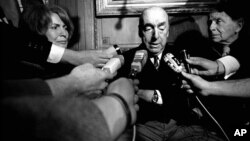Chile will reopen an investigation into the death of Nobel laureate Pablo Neruda to determine if the poet was poisoned more than 40 years ago by a military dictatorship, after tests on his exhumed body in 2013 found no evidence to back the claims.
Neruda, famed for his passionate love poems and staunch communist views, is presumed to have died from prostate cancer just days after the September 11, 1973, coup that ushered in the brutal dictatorship of Augusto Pinochet.
“There is initial evidence that he was poisoned and in that sense the signs point to the intervention of specific agents ... that could constitute a crime against humanity,” Francisco Ugas, the head of the government's humans rights department, said on Wednesday.
The poet's chauffeur has said Pinochet's agents took advantage of Neruda's illness to inject poison into his stomach while he was bedridden at the Santa Maria clinic in Santiago.
One theory on why he was poisoned is because he was a staunch communist and loyal to deposed President Salvador Allende, and it was feared he would become an opposition leader to the dictatorship.
The new forensic testing will look for inorganic or heavy metals in Neruda's remains to try to determine a direct or indirect cause of death.
It will focus on detecting if there is any cellular or protein damage caused by chemical agents, whereas the prior testing looked specifically for the remains of poison.
Easily Chile's best-known poet, Neruda achieved critical acclaim with the publication in 1924 of “Twenty Love Poems and a Song of Despair” at the age of 19. He wrote prolifically throughout his life, and also became a political activist, even running for president at one point, before dropping his bid to throw his support behind Allende.
Neruda organized a ship to bring about 2,000 refugees fleeing the Spanish civil war to Chile in 1939 and was ambassador to France during Allende's presidency.
Neruda won the Nobel Prize in Literature in 1971 “for a poetry that with the action of an elemental force brings alive a continent's destiny and dreams.”





